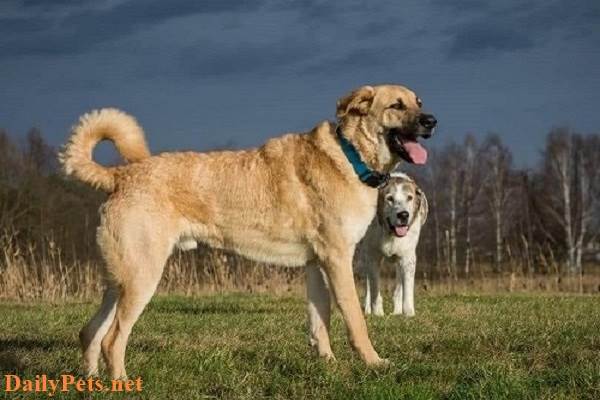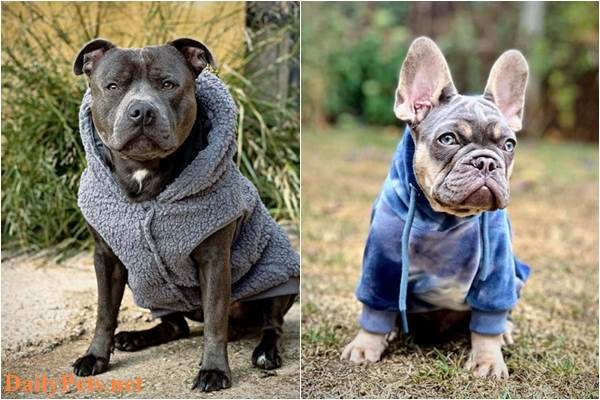If you are about to adopt a Pomeranian, please join DailyPets.net to learn about this breed’s origin, characteristics, and care below.
Learn about Pomeranians
Pomeranian dogs Origin
Pomeranians are descended from the German Spitz breed, which appeared around the 19th century. According to some records, the border area between Poland and Germany is considered their homeland. In 1900, AKC – American Kennel Club officially recognized the Pomeranian as a purebred dog.
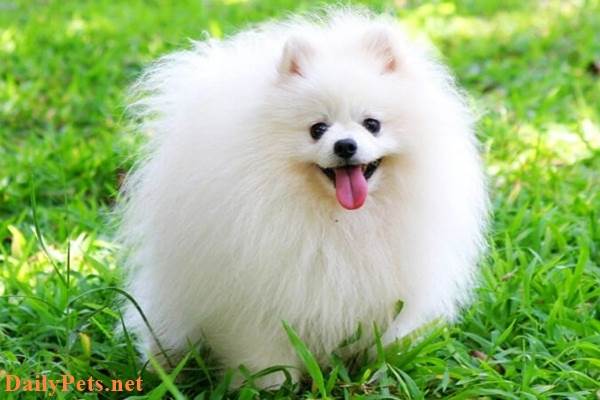
Pomeranian dogs.
In the list of the most intelligent dog breeds in the world, they are ranked number 5 thanks to their formidable memory ability.
Pomeranian dog appearance characteristics
The Pomeranian is a small-sized dog with an average height of about 15-25cm and a weight of about 2-4kg. They have a rather modest body and small and short legs. This is also the “measurement” of the cuteness of this dog.

The Pomeranian has 2 coats like the Alaskan, Samoyed, and Husky species; the hair is long, thick, and very soft, usually white, smoky gray, and fire yellow.
The head of the Pomeranian has a rather rounded structure, a fox-like face with a long, small muzzle, large eyes, and looks very sharp. The ears have a small triangle shape, always erect, helping them get the best hearing. The tail is extremely impressive by the long ruffled hair, and the curvature towards the back looks very stylish.
Pomeranian dog personality traits
The personality of the Pomeranian is usually very cheerful, energetic, and very energetic. They are small but very active, running and jumping. They are also quite active, have good self-control when playing alone, and still have fun.
Pomeranians love to be close to their owners and especially love to play with children because of their mischievous nature. Therefore, owners should pay attention to spending time hugging and stroking them so that they can feel the care of their owners.
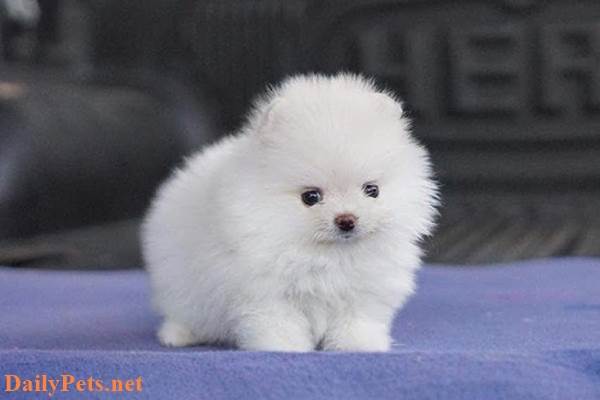
Because they are small dogs, Pomeranians can be difficult to please; sometimes, they are a bit “demanding” and pompous. Besides, sometimes, they are quite reckless when daring to attack larger dogs. Therefore, owners need to train them to avoid “provocative” large dogs, avoiding injury to Pomeranian puppies.
How to take care of Pomeranian dogs
Pomeranian dog food
Pomeranian is a rather luxurious species, so in terms of eating, they are very picky. Their food must be delicious and nutritious, especially to change the menu regularly so they do not get bored.

Pomeranian’s favorite dog food is meat, offal, fish, and duck eggs. These foods will provide them with enough protein and fat for their bodies. The meal should add rice and green vegetables to supplement the Pomeranian with starch, minerals, fiber, and vitamins, supporting a healthy digestive tract.
Note that Pomeranians should not eat too much fat because they can have digestive disorders, which is very bad for their health.
Owners must always have water available for dogs to drink and should not drink a lot of fresh milk because their digestive system is quite weak, so it is easy to get stomachaches. On average, they should be given 2 meals a day for adult dogs because they are small dogs and do not need to eat too much, leading to stomach pain.
Living conditions for Pomeranian dogs
Pomeranians can live in small spaces; however, if the temperature is too high, it will not be good for the dog’s health. At such times, you should find a cool place for your dog to play or let the dog lie in an air-conditioned room to make it feel more comfortable.
How to care for Pomeranian dogs
The characteristics of the Pomeranian species are thick, long, and 2 layers, so owners need to pay attention to brushing their hair every day and cutting their hair periodically to get a smooth coat as well as remove hair loss, especially in the hot season so they don’t feel uncomfortable.
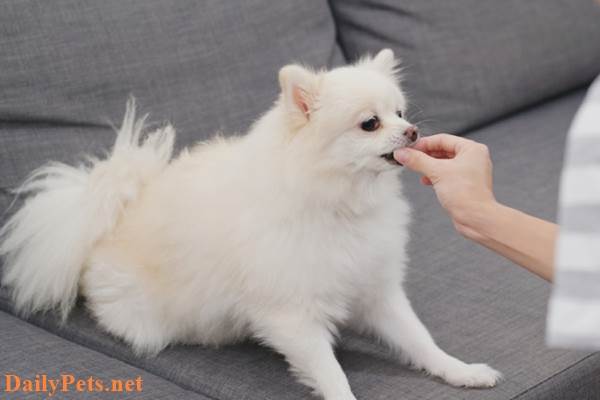
When caring for the Pomeranians, owners should make a sleeping place with a soft mattress or make a moderate cage so that they have their own space.
In addition, it is necessary to note the period of regular deworming every 6 months to avoid abdominal pain and intestinal-related diseases. Clean the nose regularly to ensure the health of the dog’s respiratory tract.
When taking Pomeranians for a walk, it’s best not to let them exercise too much but to run and jump gently; in moderation, it’s best to walk so that the dog will not lose strength and can still have fun and play.
Common diseases of Pomeranian dogs
Eye diseases that Pomeranians often suffer from, such as Cataracts, tracheobronchial disease, hypothyroidism, obesity, patellaritis, hypoglycemia… You must Observe and properly care for your dog to prevent the above diseases.

Experience buying Pomeranian dogs
How to buy a Pomeranian dog
- You should buy Pomeranian puppies from 8 weeks of age or older.
- Pomeranians are of moderate weight, not too fat or thin. Observe that the dog’s belly is large but has a thin appearance; do not buy this can be a sign of worms.
- Choose a Pomeranian puppy with a strong, sturdy chest, thick legs, fat, straight, and small.
- Examination of the eyes and nose of the Pomeranian dog should be clear, bright, and alert; a healthy nose is usually only slightly wet.
- The puppy’s gum color should be checked; the gums should be a healthy pink. Choose to buy a Pomeranian puppy with a smooth coat, standard coat color; check the inside of the ear to see if there is any discharge; if the ear is red, inflamed, oozing pus, or filled with a black substance, absolutely not should buy.
- Observe whether the Pomeranian is active and gait is normal; remember to ask the seller for the periodic health monitoring book and the vaccine vaccination book that comes with each before buying the baby.
Note when buying Pomeranian dogs
Appearance characteristics: Depending on your needs and preferences, you can choose the appearance characteristics of the Pomeranian dog, such as the body and the color of the coat, …
Pay attention to age: You can buy a puppy or an adult Pomeranian, but it is important to pay attention to the advantages and disadvantages of each age. Pomeranian dogs over 2 months old, you need to be more careful in the diet, care, and vaccinations. Pomeranian dogs have matured from 2 years or older; you will spend less time taking care of and being vaccinated against diseases because their resistance is already healthy.
Dog breed: Depending on the purpose and economy, you choose the Pomeranian breed according to your needs. Choose purebred or hybrid dogs. Usually, purebred dogs are 3 to 4 times more expensive.
Pomeranian documentation: Seller provides relevant documentation; It is necessary to have purebred certificates of dog breeders’ associations, import documents for imported dogs, etc.


